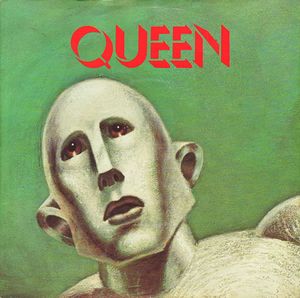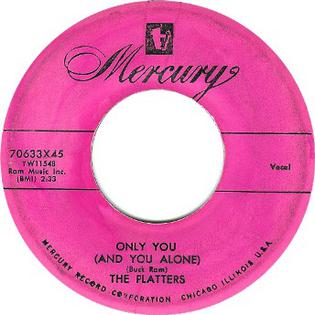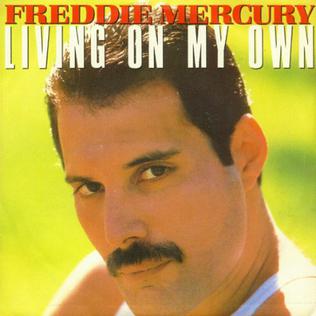Related Research Articles

"We Are the Champions" is a song by the British rock band Queen, first released on their 1977 album News of the World. Written by lead singer Freddie Mercury, it is considered one of rock's most recognisable anthems. The song was a worldwide success, reaching number two in the UK Singles Chart, number four on the Billboard Hot 100 in the United States, number three in Canada and the top ten in many other countries. In 2009, "We Are the Champions" was inducted into the Grammy Hall of Fame and was voted the world's favourite song in a 2005 Sony Ericsson world music poll. In 2011, a team of scientific researchers concluded that the song was the catchiest in the history of popular music.

Edwin Starr was an American singer and songwriter. Starr was famous for his Norman Whitfield-produced Motown singles of the 1970s, most notably the number-one hit "War".

"Crazy Little Thing Called Love" is a song by the British rock band Queen. Written by Freddie Mercury in 1979, the track is included on their 1980 album The Game, and also appears on the band's compilation album, Greatest Hits in 1981. The song peaked at number two in the UK Singles Chart in 1979, and became the group's first number-one single on the Billboard Hot 100 in the US in 1980, remaining there for four consecutive weeks. It topped the Australian ARIA Charts for seven weeks.

Greatest Hits is a compilation album by the British rock band Queen, released worldwide on 26 October 1981. The album consisted of Queen's biggest hits since their first chart appearance in 1974 with "Seven Seas of Rhye", up to their 1980 hit "Flash". There was no universal track listing or cover art for the album, and each territory's tracks were dependent on what singles had been released there and which were successful. In 1992, the US version of the album Classic Queen was released following the band's rekindled popularity in the nation.

"Only You " is a pop song composed by Buck Ram. It was originally recorded by The Platters with lead vocals by Tony Williams in 1955.

"The Great Pretender" is a popular song recorded by The Platters, with Tony Williams on lead vocals, and released as a single in November 1955. The words and music were written by Buck Ram, the Platters' manager and producer who was a successful songwriter before moving into producing and management. The song reached No. 1 on Billboard's Top 100, and No. 5 on the UK charts.
Russ Abbot is an English musician, comedian and actor. Born in Chester, he first came to public notice during the 1970s as the singer and drummer with British comedy showband the Black Abbots, later forging a prominent solo career as a television comedian with his own weekly show on British television.
"Killer Queen" is a song by the British rock band Queen. It was written by lead singer Freddie Mercury and recorded for their third album Sheer Heart Attack in 1974. It reached number two in the UK Singles Chart and became their first US hit, reaching number twelve on the Billboard Hot 100. The song is about a high-class call girl and has been characterised as "Mercury's piano-led paean to a Moët-quaffing courtesan".

"Seven Seas of Rhye" is a song by the British rock band Queen. It was primarily written by Freddie Mercury, with Brian May contributing the second middle-eight. The song is officially credited to Mercury only. A rudimentary instrumental version appears as the final track on the group's self-titled debut album (1973), with the final version on the follow-up Queen II (1974).

Freddie Starr was an English stand up comedian, impressionist, singer and actor. Starr was the lead singer of Merseybeat rock and roll group the Midniters during the early 1960s, and came to prominence in the early 1970s after appearing on Opportunity Knocks and the Royal Variety Performance. In the 1990s he starred in several television shows, including Freddie Starr (1993–1994), The Freddie Starr Show (1996–1998) and An Audience with Freddie Starr in 1996. In 1999, he presented the game show Beat the Crusher.

"Don't Stop Me Now" is a song by the British rock band Queen from their 1978 album Jazz that was released as a single in 1979. Written by lead singer Freddie Mercury, it was recorded in August 1978 at Super Bear Studios in Berre-les-Alpes (Alpes-Maritimes), France, and is the twelfth track on the album.

"You're Sixteen" is a song written by the Sherman Brothers. It was first performed by American rockabilly singer Johnny Burnette, whose version peaked at number eight on the US Billboard Hot 100 in December 1960 and number 3 in the UK in 1961.

"You're the One That I Want" is a song performed by John Travolta and Olivia Newton-John for the 1978 film version of the musical Grease. It was written and produced by John Farrar.

"No-One But You " is the only song recorded by the remaining three members of the British rock band Queen in 1997 following the death of the lead singer Freddie Mercury in 1991. Guitarist Brian May—the writer of the song—and drummer Roger Taylor share lead vocals. The song was released on the album Queen Rocks and it was also released as a double a-side single with "Tie Your Mother Down".

"Somebody to Love" is a song by the British rock band Queen, written by the lead singer/pianist Freddie Mercury. It debuted on the band's 1976 album A Day at the Races and also appears on their 1981 compilation album Greatest Hits.

"Too Much Love Will Kill You" is a song written by British guitarist Brian May of Queen, Frank Musker, and Elizabeth Lamers. The song reflected the breakdown of May's first marriage and attraction to his future wife, Anita Dobson. It was first recorded by Queen around 1988 or before, and was intended to be on the band's The Miracle album in 1989, but did not make the cut due to legal disputes following the band's decision that all songs on the album would be written by the group as opposed to individuals.

"Now I'm Here" is a song by the British rock band Queen. The sixth song on their third album, Sheer Heart Attack (1974), it was written by lead guitarist Brian May. The song is noted for its hard riff and vocal harmonies. In the UK, the song reached #11 on the charts when released as a single in 1975. The song was a live favourite, performed at virtually every concert from late 1974 to 1986.

"Living on My Own" is a song by Freddie Mercury, originally included in his first solo album Mr. Bad Guy. It was released as a single in September 1985 in the United Kingdom where it peaked at number 50. The July 1985 release in the United States had "She Blows Hot and Cold" as its B-side.
"To Know Him Is to Love Him" is a song written by Phil Spector, inspired by words on his father's tombstone, "To Know Him Was To Love Him." It was first recorded by the only vocal group of which he was a member, the Teddy Bears. Their recording spent three weeks at No. 1 on the Billboard Hot 100 chart in 1958, while reaching No. 2 on the UK Singles Chart chart. Peter & Gordon and Bobby Vinton later had hits with the song, with its title and lyrics changed to "To Know You Is to Love You". In 1987, the song was resurrected by Dolly Parton, Linda Ronstadt, and Emmylou Harris, whose Trio recording topped the U.S. country singles chart. The song is in 12/8 time.

"I'm Telling You Now" is a 1963 song by Freddie Garrity and Mitch Murray, originally performed by Freddie and the Dreamers, which, in 1965, reached number one on the American Billboard Hot 100.
References
- ↑ "It's You". Discogs. Retrieved 11 May 2019.
- ↑ "Freddie Starr — full Official Chart History — Official Charts Company". www.officialcharts.com. Retrieved 11 May 2019.